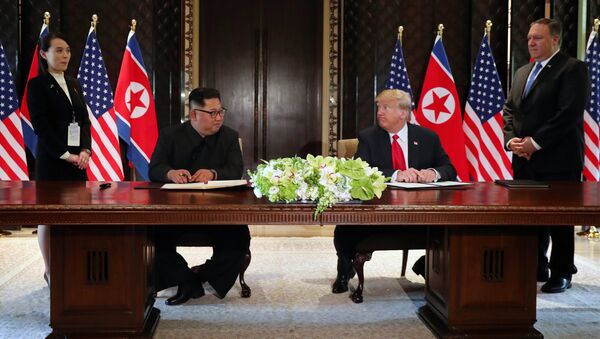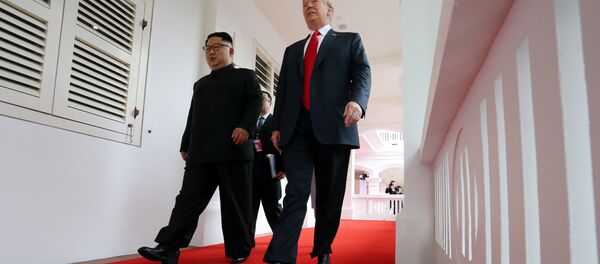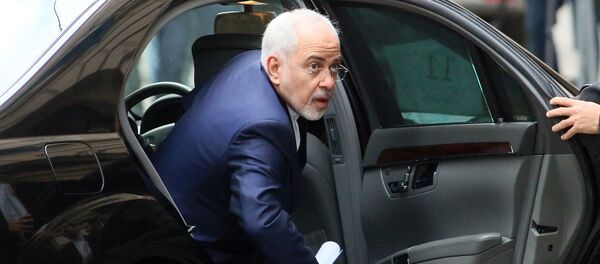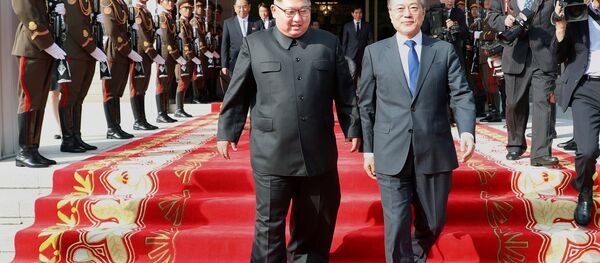"It is going to take years to clearly establish what the details would be for agreements on demilitarization for the Korean peninsula, for denuclearization [and] for an agreement to scrap missiles or the 200,000 pieces of artillery currently along the demilitarized zone," Stoffer said on Tuesday.
US President Donald Trump and North Korean leader Kim Jung Un after their summit meeting in Singapore on Tuesday pledged to re-start bilateral relations and to pursue the demilitarization and denuclearization of the entire Korean peninsula working together to achieve peace.
Stoffer said that Trump and Kim at their talks had already succeeded in presenting a striking image of optimism and hope to the world.
"The symbolism is remarkable. It is almost on the scale of [former US President Richard] Nixon going to China in 1972. Nixon’s visit was essential for world peace and North Korea [today] is a major threat to the entire world. If this process does work, this will be a huge step forward towards a safer world," Stoffer said.
"It is striking that Trump and Kim used the ‘reverse process’ to open negotiations. Usually, the normal process of setting up major diplomatic meetings and summits is for lower level officials to work on both sides for months or years to prepare the agenda," Stoffer said.
However, over the past 24 years, normal diplomatic procedures had repeatedly failed to open any effective negotiating door with North Korea, Stoffer recalled.
READ MORE: Scholar on Trump-Kim Summit: Beginning of Road Full of Detours and Bumps
"Summits were being set up [between US presidents and] with Kim Jong Un’s father Kim Jong Il in 1992, in 1994 and in 2006 and on each occasion they fell through. The normal process is not working with North Korea," he said.
As the negotiations advance other nations will have to be involved, Stoffer predicted.
"Certainly, South Korea and Japan since North Korea poses a potential existential threat to them and Russia and China as well as they are both immediate neighbors of the North Korea. So we are maybe going back to the six-party format," he said.
This would require at some point moving the US-North Korean negotiations from a bilateral format for the talks to a multilateral framework, Stoffer noted.
"The problem was we got nothing for it. I didn’t see anything in the joint statement that hadn’t been accepted by Kim before the meeting… It looks crazy to me," he said.
The statement also talks about verifiable inspections only. It does not say anything about irreversible inspections.
Contrary to Trump’s claim that scrapping the exercises would save large amounts of money from the US defense budget, Stoffer said the savings would be only marginal.
"The military exercises do not cost a great deal of money contrary to what Trump said. They give reassurance to South Korea and Japan," he said.
Stouffer also observed that in comments at the Group of Seven (G7) industrial nations summit in Canada last weekend, Trump limited his focus on a missile agreement with North Korea to scrapping only long range, or intercontinental ballistic missiles.
READ MORE: N Korea Offers Nothing as Trump Agrees to Halt US-S Korean Exercises — Hayden
"When Trump spoke in Quebec he only referred to a possible agreement on long range missiles. He did not mention short and medium range missiles that can be fitted with a nuclear warhead to South Korea or Japan… I would be upset as a US ally," he said.
If the denuclearization process advances and succeeds with North Korea, even Iran may be encouraged to renew negotiations with the United States despite Trump’s decision to pull the United States out of the 2015 Joint Comprehensive Plan of Action (JCPOA) with Tehran, Stoffer suggested.
"This might also be a signal to Iran that Trump really can play along and be positive and that a return to a nuclear agreement with Iran may be possible," he said.
"There will be a need for many international inspectors: North Korea will have to get used to hundreds of inspectors visiting not just agreed sites, but going anywhere they like," he said.
The North Koreans had built hundreds of tunnels and underground weapons facilities throughout their country, Stoffer remarked.
"The inspectors will have to verify that they are not holding back any weapons there," he said.
Dr. Howard Stoffer served in the Foreign Service of the United States from 1980 to 2005, retiring as a member of the Senior Foreign Service of the Department of State. He served for seven years as the Deputy Executive Director of the Counter-Terrorism Committee Executive Directorate of the UN Security Council.






